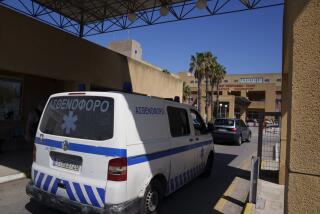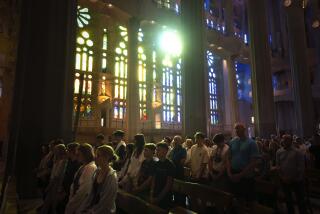Foreign Briefing: Greek tourism hurt by social unrest
- Share via
1. The sun, the sea, the near-daily scenes of social unrest. It’s no wonder cruise ships and chartered aircraft are circumventing Greece, taking travelers to trendy Turkey and Egypt instead.
Greek travel associations said hotel bookings were down for a second straight season, seesawing between a 30% drop in May, when austerity measures sparked rioting, to about 10% in July. Unofficially, the decline is steeper. Struggling hoteliers estimate a 30% drop in stays, forcing many of the country’s small-scale hostel owners to close for the season or shed their money-losing digs.
Ippocrates Valavanis, a plumber who rents out six seaside rooms at the once-bustling hotspot of Petra on the Aegean island of Lesbos, said: “There’s not a tourist in sight. And with the new tax measures requiring me now to declare everything, I’m better off keeping this place shut.”
Greece is home to about 9,550 hotels with as many as 40,000 rudimentary room-and-board hostels that operate only during the summer season. To offset losses, ritzy resorts from Chalkidiki in the country’s rugged north to Crete in the south are offering rock-bottom deals, including upgrades and all-inclusive packages. The government is promising compensation to travelers stranded by industrial actions or even “stuck [in the country] by a volcano in Iceland,” as Culture and Tourism Minister Pavlos Geroulanos recently said.
“We are making fools of people who may be making the trip of a lifetime to visit humanity’s greatest monument only to encounter striking workers [shutting down the Acropolis],” said Lysandros Tsilidis of the Hellenic Assn. of Travel & Tourist Agencies.
Mass cancellations have halted and last-minute bookings seem promising, but experts still predict an overall drop of 10% to 15% in tourism revenues, on top of a 10% drop in 2009. Greece relies heavily on tourism, which accounts for more than 15% of its gross domestic product.
“Quick fixes and campaign blitzes won’t do,” said George Nikitiades, the country’s tourism chief. “Tourism has to find its feet again. It’s a vital part of the Greek economy, and we’re on a crusade to revive it.”
— Anthee Carassava
2. France
After tens of thousands of years under the Siberian frost, the 5-foot-long body of a baby woolly mammoth went on display at the Musée Crozatier in Puy-en-Velay. The body, discovered last year, will be exhibited in a special cryogenic chamber until Nov. 15, when it will be returned to Russia.
— Associated Press
3. Egypt
Multiple companies bid on the final phase of a $550-million museum that will showcase what officials said would be the largest collection of Pharaonic treasures in the world. The Grand Egyptian Museum in Giza will span 117 acres and display 100,000 artifacts.
— Reuters
4. Africa
Since 1970, Africa’s game parks have lost more than half the big mammals, such as lions and buffalo, that draw millions of tourists each year, a new study found. The study, by experts from the United Nations, the London Zoological Society and elsewhere, blamed hunting and farming for the losses.
— Reuters
5. Malaysia
A dozen of more than 80 dive sites have been closed to save fragile corals, already damaged by high water temperatures this year, said Abdul Jamal Mydin, director general of the Department of Marine Parks. The off-limits areas include spots around the islands of Perhentian, Redang and Tioman.
— Associated Press
Caution spots
The State Department recently issued warnings or alerts for these areas:
Kenya, because of increased threats made against public areas and the potential for civil disturbances related to an Aug. 4 referendum
Uzbekistan, because of the potential for a terrorist attack or civil disturbance
More to Read
Sign up for The Wild
We’ll help you find the best places to hike, bike and run, as well as the perfect silent spots for meditation and yoga.
You may occasionally receive promotional content from the Los Angeles Times.






